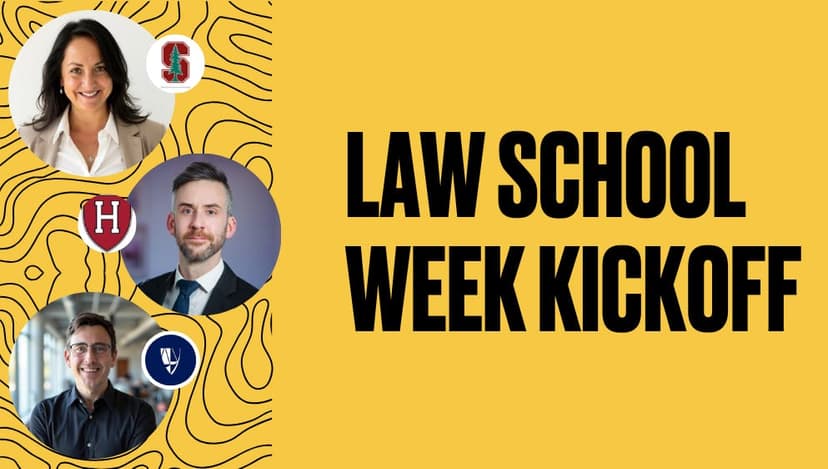The Top 10 Law Schools for Education Law
Are you interested in pursuing a career in education law? Look no further! Our article highlights the top 10 law schools for education law, providing you with valuable insights on the best programs to help you achieve your career goals.
Posted June 13, 2025

Join a free event
Learn from top coaches and industry experts in live, interactive sessions you can join for free.
Table of Contents
If you are considering a career in education law, it's important to select the right law school. Education law encompasses a wide range of legal matters, including policy-making, administrative proceedings, and litigation issues related to education. The following article will delve into the top 10 law schools for education law, providing an in-depth analysis of what each institution has to offer.
What is Education Law and Why is it Important?
Education law refers to the legal principles and policies that govern the education system. As the education system plays a vital role in shaping the future of our society, education law is of utmost importance. It is crucial to ensure that the education system operates fairly, safely, and effectively, providing equal opportunities to all students.
This area of law addresses issues such as student rights, teacher rights, and school funding. It sets standards for curriculum, teacher qualifications, and student achievement. Additionally, education law plays a crucial role in protecting students from discrimination and ensuring they receive appropriate accommodations for disabilities. Without the framework of education law, the education system would lack structure and accountability, potentially leading to unequal access to education and a lack of quality education for all students.
How We Ranked the Top 10 Law Schools for Education Law
Our ranking of the top 10 law schools for education law takes into consideration various factors. These factors include academic excellence, the depth and breadth of their education law curriculum, the quality of clinical programs, and opportunities for hands-on learning. We also evaluate the institution's reputation and the accomplishments of its alumni.
In addition to these factors, we consider the expertise of the faculty in education law, their involvement in relevant research and publications, and the impact of their work. Schools with faculty members who have published influential articles or books in the field of education law receive higher rankings. Additionally, we assess the availability of networking opportunities for students interested in pursuing a career in education law. Schools that offer mentorship programs, internships, and connections to alumni working in the field receive higher rankings. Overall, our ranking aims to provide prospective students with a comprehensive understanding of the top law schools for education law, considering various factors that contribute to a well-rounded and valuable educational experience.
1. Harvard Law School
Harvard Law School is recognized as one of the top institutions for education law. It has a renowned education law faculty that includes leading scholars in the field. The law school offers an expansive education law curriculum and provides students with numerous opportunities for hands-on learning. Harvard Law School's Education Law Clinic is highly regarded as one of the best in the country, providing students with practical experience in education advocacy and policy-making.
In addition to the Education Law Clinic, Harvard Law School offers various opportunities for students interested in education law. The school hosts several education law-related events throughout the year, including lectures, conferences, and symposia, allowing students to learn from field experts and network with professionals. Additionally, Harvard Law School is deeply committed to public service, with many of its graduates pursuing careers in education law-related public interest organizations. The school provides resources to support students interested in public interest work, including funding for summer internships and post-graduate fellowships. Overall, Harvard Law School is an excellent choice for students aspiring to a career in education law.
HLS Class Profile
| Total Students | 561 |
| Acceptance Rate | 9.5% |
| Median LSAT | 174 |
| Median GPA | 3.93 |
| Countries Represented | 22 |
2. Yale Law School
Yale Law School is widely recognized for its comprehensive curriculum in education law. The school offers a wide range of courses covering various aspects of education law, including educational policy, school reform, and civil rights in education. Additionally, the law school's education law clinic provides students with the opportunity to work on real cases under the guidance of experienced attorneys.
In addition to its strong curriculum, Yale Law School also hosts various events and conferences focused on education law. These events bring together experts in the field to discuss current issues and trends in education law. This provides students with valuable networking opportunities and exposure to cutting-edge research. Furthermore, the law school’s commitment to public service is evident in its education law program. It offers several opportunities for students to engage in pro bono work related to education law, including partnerships with local schools and advocacy organizations. These experiences allow students to apply their legal skills in a meaningful way and make a positive impact in their communities.
Yale Law School Class Profile
| Total Students | 213 |
| Acceptance Rate | 5.5% |
| Median LSAT | 175 |
| Median GPA | 3.96 |
| Countries Represented | 12 |
3. Stanford Law School
Stanford Law School is another top-tier law school that offers a breadth of education law programs and clinics. Among the law school's strengths are its education law clinics, which include the Youth and Education Law Project and the Education Advocacy Clinic. These clinics provide students with opportunities to gain practical experience by representing clients on education-related matters.
In addition to its clinics, Stanford Law School also offers a variety of education law courses, such as Education Law and Policy, Special Education Law, and Higher Education Law. These courses cover topics such as constitutional law, civil rights, and education policy. Additionally, the school is home to the Stanford Center for Education Policy Analysis (CEPA), which conducts research on education policy and offers evidence-based recommendations to policymakers. CEPA's research focuses on various topics, including school finance, teacher quality, and college access. Students at Stanford Law School have the opportunity to collaborate with CEPA researchers and contribute to their ongoing projects.
Stanford Law School Class Profile
| Total Students | 174 |
| Acceptance Rate | 7.26% |
| Median LSAT | 173 |
| Median GPA | 3.95 |
| Countries Represented | 14 |
Looking for more info on Stanford? Read our articles on Stanford Law School: Program and Application Overview and Stanford Law School Acceptance Rate: Insights Into Admission Statistics.
4. Columbia Law School
Columbia Law School is well-known for its pioneering research in education policy and reform. The faculty at the law school consists of scholars who have significant contributions to education law matters. Columbia Law School offers a wide variety of education law courses covering topics like constitutional law, disability law, and school finance. Additionally, the school provides a comprehensive education law clinic that specializes in special education and disability rights.
Columbia Law School not only offers coursework and clinical experiences but also houses various research centers and initiatives dedicated to education policy and reform. The Center for Public Research and Leadership collaborates with education leaders to develop and implement effective policies and practices. The Education Law and Policy Society, a student-run organization, hosts events and discussions on current issues in education law and policy.
Additionally, being situated in New York City, Columbia Law School provides exceptional opportunities for students interested in education law and policy. Students can take part in externships and internships with organizations such as the New York City Department of Education, the Legal Aid Society, and the Education Law Center. These experiences enable students to apply their classroom knowledge to real-world situations and establish valuable connections in the field.
Columbia Law School Class Profile
| Total Students | 415 |
| Acceptance Rate | 12.2% |
| Median LSAT | 173 |
| Median GPA | 3.90 |
| Countries Represented | 21 |
5. University of Michigan Law School
The University of Michigan Ann Arbor Law School offers an exceptional clinical program in education law. The Education Law and Policy Clinic at the law school provides students with the opportunity to work on various education law issues, including special education, school discipline, and discrimination. Additionally, the law school offers a mentorship program that connects students with alumni who are leaders in the field of education law.
Students who participate in the Education Law and Policy Clinic have the chance to work on real cases and gain practical experience in the field. The clinic collaborates with local schools and organizations to provide students with hands-on experience in advocating for students' rights and improving education policies. This practical experience, combined with the mentorship program, prepares students for successful careers in education law.
University of Michigan Law School Class Profile
| Total Students | 320 |
| Acceptance Rate | 5% |
| Median LSAT | 171 |
| Median GPA | 3.84 |
| Countries Represented | 15 |
6. New York University School of Law
New York University School of Law stands out for its specialized programs in education policy and practice. The law school provides a range of education law courses covering topics such as education finance, charter schools, and education law reform. Additionally, the law school's education law and policy clinic offers students the opportunity to work on real cases involving education law issues.
NYU School of Law Class Profile
| Total Students | 430 |
| Acceptance Rate | 15.65% |
| Median LSAT | 172 |
| Median GPA | 3.90 |
7. University of California, Berkeley School of Law
The University of California, Berkeley School of Law places a strong emphasis on social justice issues within the field of education. Its education law curriculum focuses on topics such as race and ethnicity in education, access to higher education, and school desegregation. Students also gain practical experience through the education law clinic, where they represent clients on education-related matters.
UC Berkeley School of Law Class Profile
| Total Students | 341 |
| Acceptance Rate | 5.07% |
| Median LSAT | 170 |
| Median GPA | 3.87 |
| Countries Represented | 8 |
8. Georgetown Law
Georgetown University Law Center has a strong emphasis on legislative advocacy for educational equality. The law school's education law curriculum includes numerous courses that cover topics such as school choice, education finance, and civil rights in education. Additionally, the law school offers an education law clinic that focuses on legislative advocacy for educational equality.
Georgetown Law Class Profile
| Total Students | 600 |
| Acceptance Rate | 5.5% |
| Median LSAT | 171 |
| Median GPA | 3.91 |
| Countries Represented | 14 |
9. Northwestern Pritzker School of Law
Northwestern Pritzker School of Law is recognized for its interdisciplinary approaches to education policy and practice The law school offers a variety of courses covering education law issues, including education policy, charter schools, and special education law. Additionally, the law school's education law clinic provides students with the chance to work on a wide range of education law matters under the guidance of experienced attorneys.
Northwestern Pritzker School of Law Class Profile
| Total Students | 241 |
| Acceptance Rate | 3.8% |
| Median LSAT | 172 |
| Median GPA | 3.92 |
10. University of Pennsylvania Carey Law School
The University of Pennsylvania Carey Law School provides special opportunities for practical experience in education advocacy. The law school's education law curriculum covers a range of education law issues such as school finance, deprivation of education, and school discipline. Additionally, the education law clinic allows students to gain hands-on experience in representing clients on education law matters.
UPenn Carey Law School Class Profile
| Total Students | 248 |
| Acceptance Rate | 9.74% |
| Median LSAT | 172 |
| Median GPA | 3.92 |
Comparing the Top 10 Schools for Education Law: Strengths and Weaknesses
The law schools listed above are all great choices for those interested in a career in education law, but each has its strengths and weaknesses. For example, Yale Law School provides a comprehensive education law curriculum, while Columbia Law School is known for its pioneering research in education policy and reform. Deciding on the best law school for you will depend on your specific goals and preferences.
Tips for Choosing the Right Law School for Your Educational Goals
When choosing a law school for your educational goals, there are several factors to consider, including the curriculum, faculty expertise, clinical opportunities, and location. It is also essential to research the institution's reputation and the careers its graduates pursue. By carefully considering these factors, you can make an informed decision that will set you on the path to a successful career in education law.
Get Into Your Dream Law School With the Help of an Expert
It can be difficult, especially when in the midst of applying to law programs, to find reliable information out there about the application process. An experienced coach, one who has gone through the law school application process, or who has coached many successful admits before, can be the difference between earning that coveted admissions letter and not. The right coach can offer the guidance and mentoring you'll need to secure a seat at your dream school. Take a look at our list of coaches here, or view our highest-rated coaches below.
Read Next:
- How to Get Into a T14 Law School
- Law School Application Timeline: Your Step-by-Step Guide
- The Top 10 Law Schools for Corporate Law
- The Top 10 Law Schools for Criminal Law
- Top 10 Law Schools for Maritime & Aviation Law
- Harvard Law School Vs. Yale Law School: An In-Depth Comparison
FAQs
What is education law?
- Education law is the set of rules and principles that govern the education system. It includes policies related to student rights, teacher rights, school funding, and protecting students from discrimination.
Why should I study education law?
- Studying education law helps you understand how the education system works legally and how to ensure fair and equal opportunities for students and teachers. It also opens up career opportunities in education, advocacy, and policy-making.
What are the best law schools for education law?
- Some of the top law schools for education law include Harvard, Yale, Stanford, Columbia, and the University of Michigan. These schools offer specialized programs and clinics in education law to help students gain practical experience.
How do I choose the right law school for education law?
- When choosing a law school for education law, consider factors like the curriculum, the strength of the education law faculty, available clinical programs, networking opportunities, and the school’s reputation in education policy.
What is the application process for law school?
- The law school application process typically involves submitting your academic transcripts, recommendation letters, LSAT scores, and a personal statement. Some schools may also require a resume or other documents, depending on their requirements.
Browse hundreds of expert coaches
Leland coaches have helped thousands of people achieve their goals. A dedicated mentor can make all the difference.



















